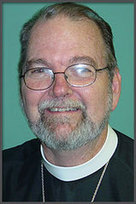
Zechariah 3-4; Psalm 135; Mark 13
As the Season of Advent ends, the thirteenth chapter of Mark offers somber warnings about how we face the future. Often called the “little apocalypse” of his Gospel, the last verses are heard on the First Sunday of Advent in Year B. They remind us that no one knows the day or the hour of the Lord’s coming. Our calling is to “keep awake,” be alert, watch, take note of things. These verses set the stage for the anticipatory nature of Advent, and help us remember that God may burst into our lives at the most unexpected time in the most unexpected situation. For some, this may seem a little frightening, but for others, it shows how God uses people, places and ideas in ways that open us up to an entirely new way of looking at life.
Sadly, the majority of this chapter has been used by some Christians to point to God’s wrath unleashed upon that with which he disagrees. Everything from AIDS to natural disasters to the loss of elections has been blamed on God’s displeasure with humanity. However, this kind of futuristic theology takes Mark’s message out of context. Most commentaries agree that Chapter 13 is about the fall of Jerusalem and destruction of the Temple in 70 A.D. To make the text into a predictor of events centuries ahead of time dishonors its intent.
As we await God’s greatest gift to us, let us have confidence in a future not filled with fear, but filled with hope, confidence and determination to live into the ministries to which God has called us.
Doug McCaleb
Trinity Cathedral Miami
 Saturday, December 21, 2013
Day 349 – Zechariah 1-2, Psalm 134, Mark 12
Sometimes, as we drift into sleep, or slowly wake up on a
rare day without an alarm clock, we can dream and think at the same time. Every once and a while in this cognitive state of sleep we can interact with our dreams. We can guide them and be guided by them. The majority of Zechariah is a
night vision. It is a divine dream that Zechariah interacts with and dialogs with. Zechariah both sees and converses with the vision. Zechariah both sees and asks.
This night vision illustrates the importance of Jerusalem
to the Lord. In this vision Zechariah sees men and angels and then asks
about their intentions. One man has been sent to measure
Jerusalem. With his stick, this man measures a Jerusalem that is much larger
than before. This Jerusalem, which exceeds its predecessor’s
size, demonstrates the Lord’s love for the city and intention to restore her.
LikeHaggai, Zechariah is concerned with the rebuilding of the
city. There is also a cry for the exiles to return; particularly for those who
are in the north. Together they will make a country that is better then before.
Together they will surpass the past. Together there will be a
holy land, Zechariah 2:12. This is the one and only
time that this region is called the Holy Land in the Bible.
Hopefully peace can prevail in this region. Hopefully
Jerusalem can become a beacon of hope for all people and not just a place of
conflict. Hopefully it is not just a dream.
The Rev. Spencer B. Potter
 – Haggai 1 -2; Psalm 133; Mark 11
“O come, O come, Emmanuel, and ransom captive Israel, that mourns in lonely exile here until the Son of God appear.” Rejoice! Rejoice! Emmanuel shall come to thee O Israel!”
Though brief, the two chapters of the prophet Haggai say much about our modern day Advent and approaching Christmas season. This little book tells us about the folk in and around Jerusalem following the exile period. Many have returned to their homeland and many had just come out of hiding. But whether exiled physically or just spiritually, the Lord through Haggai is calling them back to relationship with their God. The people have been so busy taking care of the own personal needs they have ignored God’s Temple. Through God’s Prophet, Haggai, God chides the people, “are you satisfied with what you have done for yourselves.” “Now therefore thus says the Lord of hosts: Consider how you have fared. You have sown much, and harvested little; you eat, but you never have enough; you drink, but you never have your fill; you clothe yourselves, but no one is warm; and you that earn wages earn wages to put them into a bag with holes.”
God’s message through Haggai is really not so much about the rebuilding of the temple as it is about acknowledging God’s Presence in their lives. The people have lost their sense of unity and purpose. They are attempting to plow through life spiritually impotent. No matter what they have it doesn’t seem like enough. Does this often apply to us? ---- But the Lord takes the lead and through Haggai says, “I am with you.” This is the meaning of the word Emmanuel [God is with us!]. Carl Jung, the famous psychologist had this quote inscribed over is door in latin:
“Vocatus at que non Vacatus Deusadent” – Bidden or not Bidden God is Present!
When the people pull together as a people of God, God is in the midst of them –The Psalmist reminds us today: “Oh, how good and pleasant it is, when brethren live together in unity.”
But, like the post exile people being addressed by Haggai, often we don’t recognize God’s presence in our midst. We have busy lives with much to attend to. Chapter 11 of Mark’s Gospel is another prime example. Jesus is in the midst of God’s people but still to most, goes unrecognized. This Triumphal Entry in Chapter 11, we refer to as Palm Sunday, will culminate in less than a week’s time with shouts of “Crucify Him!” This Messiah, This Emmanuel, born on a starry, starry night in a remote little village will die an earthly death because of humankinds desire to make God’s Presence with us conform to our own design. Jesus enters not as the King he is being proclaimed but as a meek and suffering servant of all.
Let us not continue to look for God’s presence in signs of political power and false majesty but rather in those attributes of a nurturing, guiding, God of love, service and harmony. Lord, let us see you for what you are and acknowledge your presence in our midst. Help each of us to build your temple in our individual and the collective hearts of our sisters and brothers.
“O come, O come, Emmanuel, and ransom captive Israel, that mourns in lonely exile here until the Son of God appear.” Rejoice! Rejoice! Emmanuel shall come to thee O Israel!”
Seasons Blessings,
Tom+
The Venerable Thomas A. Bruttell
Archdeacon, Diocese of Southeast Florida
 Zephaniah 3, Psalm 132, Mark 10
We are presently in what the ancient church calls the Octave before Christmas, (December 17-24) in which traditionally seven antiphons are sung during Vespers. They’re called the O Antiphons and choirs and monasteries, convents and Cathedrals around the world sing a different one each day in preparation for the coming of the Christ. Each song highlights a title for the Messiah: O Wisdom, O Lord, O Root of Jesse, O Key of David, O Rising Sun, O King of the Nations, O Emmanuel. As one gets closer and closer to Christmas we move from looking ahead to finally noticing the present. Emmanuel. God IS with us.
Our readings today do the same… point us to the present reality of God in our midst. It seems as we get closer to the completion of The Bible Challenge, as we get closer to Christmas, as we get closer to yet another New Year time becomes nebulous, don’t you think? We’ve been going back and forth between the past and future and no more so than now in our readings and in our present preparation for Christmas. Maybe that’s the point. Time is supposed to be nebulous in God’s world. Kairos time we call it. We hear in Zephaniah (after those two doomsday chapters) a promise:
I will restore you
I will comfort you
I will save the lame
I will gather the outcast,
I will bring you home
We hear the psalmist speak of the resting place of the Lord… finally settling, “Here is my resting place forever; here I will reside, for I have desired it.”
The poor will be satisfied.
The priests will be clothed with salvation.
The faithful will shout for joy.
And finally in Mark as well: We are with the disciples and Jesus on his way to Jerusalem when Jesus helps us enter into this eternal time on earth as it is in heaven: Enter as a child. Give it all away. The first shall be last. Empty yourself completely and allow me to fill your very being. The first shall be last. Who can be saved? With God all things are possible. The least are the greatest and the blind see.
Ah, of course. God is with us. Emmanuel. No waiting necessary. Blessed Advent tidings.
 Wednesday,
December 18, 2013 or Day 346
Zephaniah 2 Psalm 131 Mark 9 Bible Reflection
A song of humility.
The destruction of Israel’s Enemies. And the Transfiguration.
Today’s reading’s certainly take us on a ride as far as the
themes of scripture go. And that doesn’t even touch on Jesus the healer, the argument amongst the apostles, and the dangers of sin.
But all of this has its culmination in the Transfiguration. Jesus on the mountain top becoming the
Christ. The transfiguration is a seminal moment in the Gospels, and a seminal moment in the life of Peter, James and John. They get to the top of the mountain and they see God! And
the never want to leave! Peter thinks this is it! “rabbi it is good for us to be here!” he says!
“let us make three dwellings!” he says.
We all have these moments. Of Pure unadulterated joy. That experience of a unique oneness with God. And we usually want to stay.
But we can’t.
We must come down of the mountain. We must like
Jesus, head to Jerusalem, not to suffer necessarily, but to continue to call
others to Christ. To allow others their own mountain top experience.
At that moment on top of the hill Peter was
tempted to be selfish with his faith. With his unique relationship with the
Christ. But he saw past the temptation and continued down off the mountain to be the Rock on which the Church was founded.
Let us not be selfish with our own mountain top moments, selfish
with our faith. Come down from your high places friends and seek those who are still in darkness, who have not experienced the transfiguration, who don’t know Christ as we know them. Seek them out, and provide light, and love, to their lives.
Grey Maggiano
 Tuesday, December 17, 2013
Day 345 – Zephaniah 1, Psalm 130, Mark 8
In the next three days we will read the short book of Zephaniah. If you’re like me, you will want to read it all today so you aren’t depressed the rest of the day. All we hear today in Chapter One is gloom and doom: “I will sweep away everything from the face of the earth…I will cut off humanity from the face of the earth… that day will be a day of wrath, a day of distress and anguish, a day of ruin and devastation, a day of darkness and gloom, a day of clouds and thick darkness…”
We only hear from this book of Zephaniah once in our three year cycle of Sundays, and it did come up for us last year in Advent - Year C. However, even then, we do not hear the doom and gloom. Rather, we hear Chapter 3, which contains the resolution to the destruction proposed in the earlier verses: “I will make you renowned and praised among all the peoples of the earth, when I restore your fortunes before your eyes…(3:20b).” Now that’s a kindlier and gentler Christmas Card, isn’t it?
We can lose a lot when we do not look at these messages in their total context. Just as the doom and gloom can lead to despair if not considered only as a prelude to the possibility of God’s redemption, so too the glory of redemption can lead to complacency if not considered in the context of what life will be without God. Zephaniah’s age was one in which the people could relate to both sides of the equation. There was the doom and gloom that Hezekiah had recently lost 45 cities to Sennacherib, and more recently, with further kings losing power to Assyrian influence, the religious life of the people had correspondingly suffered. However, there was now emerging the hope of redemption, since Assyria is now declining, and restoration and reform seem to be a possibility.
So maybe today is a good day to look at the context of our own life story. Is not that the opportunity that the season of Advent provides us? To understand that the doom and glooms in my own life can only be fully understood and appreciated in the light of God’s redemption of me, and conversely the full appreciation of God’s redemption of me can only take place within the context of my fuller understanding of how gloomy life is without God in it.
To get to that full understanding requires a lot of Advent patience. And a lot of that patience has to do with understanding who Jesus is and what his plan for the Kingdom is, which is exactly what Peter struggles with in Mark 8 today. It is not unlike the situation with John the Baptist questioning Jesus from his jail cell that we heard just this past Sunday.
Need reassurance that patience will pay off? Let Zephaniah 1 soak in a bit, but before you get depressed skip to Zephaniah 3. Let the reality of the cross soak in a bit as you read Mark 8, but before you despair and stop walking with Jesus, skip to Mark 16. By keeping the life of the Gospel and our living into it in context, our resulting attitude can be like that of the author of today’s Psalm 130: “I wait for the Lord, my soul waits, and in his word I hope; my soul waits for the Lord more than those who watch for the morning, more than those who watch for the morning. O Israel, hope in the Lord! For with the Lord there is steadfast love, and with him is great power to redeem (Psalm 130:5-7)”.
- Marty Zlatic
 Evangelism – that art form that allows us to share the love of God with another in such a way that they also love God. It is not an easy trick and it so often fails. As we look at the reading from Mark, I think some of the reasons are clearly visible.
Jesus has been doing remarkable things and God’s power has been on display. However to the traditional leaders of the faithful, he isn’t doing it right. There are rules you know, and you – Jesus and company – are not following them! The desire to follow God has become deformed into following rules. Some of those laws, such as pledging the money that should be used to support aging parents to the altar, are self-serving. No matter, they are now part of the tradition and often we are better at teaching tradition than sharing true and powerful experiences of God.
Jesus’s statement against this understanding of defilement, breaking God’s law, is telling. The problem is not what happens to the outside of you, but what is coming out of the inside of you. Your words and actions are what is important to God, not what you eat or how you eat it.
Habakkuk shares today a poem, perhaps a prayer, describing the awesome experience of nature, of a storm, and attaching it to the victories achieved in battle. History and nature intertwine here to explain the experiences of the people in light of the activity of God. God controls the cosmos and God controls history.
Habakkuk assures his readers that rejoicing in the Lord is not in response to victory alone. That even if there were no food, fruit on the vine, failed olive crops, and flocks lost, that even then, God is the source of salvation and strength.
We need to know that. We need to know that faith is not about following laws, or always winning because “God is with us.” Instead God is our hope in times good and bad. Our faith is not proved by our success but by our reliance on God in all things. That in God is there is a healing that we might not expect, or perhaps in the case of the Syropheonician woman, even seem to deserve.
Today, may you find God in the world around you. May you find the healing that even you may not believe that you deserve. May you find salvation.
 Habakkuk 1 At this point in our exploration of Holy Scripture, a lot must seem to be awfully repetitive. The classic age of prophecy encompassed a couple of centuries that were punctuated by two traumatic events for the ancient Jews: the collapse of the northern Kingdom of Israel in 721 BC and the fall of the southern Kingdom of Judah (from which the word “Jew” is derived) in 586 BC. The prophets of these stressful times had a consistent message: that the people shouldn’t have a false sense of security (that was based on a false sense of religion), and that doom was coming.
We know next to nothing about the prophet Habakkuk. Some biblical scholars believe that the three chapters of this short book were written in different periods and were not originally a unit. Others hold that the man Habakkuk preached and wrote during the reign of King Jehoiakim (609-598 BC), just prior to the first deportation of the Babylonian Exile.
The first chapter of the book (and the first five verses of chapter 2) is written as a dialogue between the prophet and God. Habakkuk is tormented by the fact that violence prevails and God seems to tolerate great evil. The response the prophet receives from God is dismaying: that the Chaldeans (Babylonians) are God’s instrument sent to punish the wicked, including the wicked of Judah. Yet how could a just God use such violent men to punish people who are less evil? And how could God allow so many innocent and righteous people suffer just for the sake of punishing the wicked? The Chaldeans are so bad that they even worship their own military might! (Hmmm!)
Mark 5 Since we have already read through the Gospel of Mark last winter, and someone else has already written a commentary on it, my remarks here will be very brief. Chapter 5 shows Jesus on a preaching tour, but it turns out that this particular tour was characterized more by healing than preaching. (Although the healings, of course, were an enacted form of preaching: Jesus’ mighty deeds gave credence to his words.)
Jesus cures the Gerasene demoniac. The people of the surrounding area were amazed, but apparently not grateful, since they begged Jesus to leave the region. Perhaps they were more concerned about the economic loss from the herd of pigs than they were about the healing of a man imprisoned by severe mental illness. There must have been many Gentiles in the region, for Jews would not raise pigs nor eat of their flesh.
Next Jesus raises the dead daughter of one Jairus, who had a leadership position in the local synagogue. But the telling of this particular episode is interrupted by another: Jesus’ healing of the woman who had suffered endlessly from a flow of blood. Then the narrative reverts to the story of Jairus’ daughter. Oddly, once Jesus restores the girl to her parents “he strictly charged them that no one should know this…” Jesus gives this admonition several times in Mark’s Gospel. One wonders: Isn’t the point to proclaim Jesus? Why be hush-hush about marvelous healings? Biblical scholars call this puzzle in Mark the “Messianic secret”. Perhaps the reason for this is that Jesus was afraid that people would misinterpret his role. The traditional expectation of the Messiah was that he would be a strong political/military hero who would overthrow the foreign oppression (Rome in Jesus’ day). But Jesus understood that his role was very different. It wasn’t the razzle dazzle of the miracle cures that was most important in his ministry. Rather, it was his extreme love in going to the Cross that was the pinnacle of his mission. Only after the Resurrection could people begin to piece it all together and begin to make sense of it all.
 Devotional Micah 5
This past week we had some exciting times taking place in the new Diocese of Toliara. We had our first ordination to the priesthood, our first strategic planning sessions and development of a mission and vision, followed by four days of first diocesan Synod (Convention) and then the events were climaxed by the installation of our first Archdeacon. It was an exhilarating eight days. All of this started earlier in the year through the election of our first diocesan bishop and creation of the new diocese of Toliara. Back in May, we began preparing for these awesome events. The anticipation and excitement was overwhelming. When time got closer, I sensed a mixture of trepidation and excitement in the air. Maybe because I was a bit slower in seeing how this was going to all play out. Maybe because all of this was unknown for the Diocese and we were treading on new ground. Or maybe it was because our past was brief and our future was wide open. But after the first couple of days, by the grace of God, everything seemed to just move into place.
This reminds of us of the passage from Micah Chapter 5, where the Scriptures inform us about the promised Ruler from Bethlehem (v2). Bethlehem was the smallest of the clans and possibly the least of them. I’m sure there was lots of trepidation and excitement for all to rise to the occasion. Those in power like King Herod would feel threatened while those not in power, like the majority of Jews, wanted to be empowered. Advent is like this, it’s the time of preparation as we look to the past, to the first coming of the Messiah and with anticipation and trepidation towards the future, the second coming of the Messiah, the King of Kings.
May your anticipation and trepidation during advent lead you into a sense of Majesty at the throne of the King of Kings.
+Todd
 The tune of We Three Kings streams regularly through my house these days. My eight-year-old son, Jack, is learning it for piano class.
Kings is not your typical Christmas carol. It is played in a minor key. In Listening to Music, author Craig Wright explains that in the Near East, minor key tonality is often used in optimistic tunes. To western ears, however, minor keys sound somber and foreboding.
Reading Matthew 26 in the second week of Advent, We Three Kings reverberates in my mind. I cringe as the plot against Jesus comes to fruition. It is painful to see him praying in agony and devastating when he is betrayed and denied by his own. Micah’s prophetic words, “They do not know the thoughts of the Lord; they do not understand his plan,” ring true.
This is not typical Advent material – and yet there is a great beauty in it. All the betrayal, the suffering, the pain and loss accomplished what was begun in Jesus’ birth. Christ’s movement toward Calvary is God’s love in motion. The pain and the joy are all part of the whole.
We Three Kings ends this way:
Glorious now behold him arise;
King and God and sacrifice:
Alleluia, Alleluia, sounds through the earth and skies.
Alleluia and Amen.
--Susan Beebe
|










 RSS Feed
RSS Feed